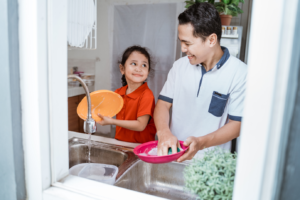Innovations and Conveniences: Ups and Downs of Parenting in the 21st Century
 Life in the 21st century is full of innovations and conveniences. The scope of these changes and their impact on our experiences are vast from the food we eat to how we do our daily tasks. We can do many things faster, more efficiently and more conveniently. Food is tastier and entertainment more accessible, stimulating and exciting. While these are potentially beneficial, as a psychologist working with children I see the many challenges that come along with these modern day advances.
Life in the 21st century is full of innovations and conveniences. The scope of these changes and their impact on our experiences are vast from the food we eat to how we do our daily tasks. We can do many things faster, more efficiently and more conveniently. Food is tastier and entertainment more accessible, stimulating and exciting. While these are potentially beneficial, as a psychologist working with children I see the many challenges that come along with these modern day advances.
Conveniences that make our lives easier from microwaves and prepared foods to devices with search engines, we have eliminated many steps to achieve an end. While supportive of our fast paced life styles, planning, sequencing, carrying out tasks seems to happen almost without effort. Lost is time to ponder, consider pros and cons, practice trial and error problem solving, engage in small talk and experience waiting. There is an expectation of immediate gratification. We can get answers and information on our phones in an instant. We can now grab and go, eating on the run, making time together in the kitchen or at the dinner table less necessary.
In the realm of entertainment, media is everywhere. It is in our cars, planes and on our mobile devices. While we are relieved as parents of the endless whines “are we there yet?” we have lost some good things. Looking out the window at the terrain, talking or playing games like “I Spy” are no longer part of travel today. In public, we no longer need to even look at the people around us, much less talk to them. We can now travel in our own personal bubble and not interact with anyone else.
Social media has its benefits in sharing connection. On the down side however, users can create the identity they want and say things without looking at the person receiving the message. As teens explore identity and romantic relationships, it is an open playing field without much feedback. It can be open season for sexting, break-ups, bragging and bullying.
The virtual worlds within the context of these games are visually exciting and provide immediate feedback. Conquering a quest, blowing up marauders, doing flips, constructing a your own world and epic wins are all far more gratifying than doing homework, brushing teeth, showering or going to bed.
Finally, snacks, candy and prepared foods are widely available with salt, sugar and chemicals that heighten the experience of eating. Consequently, these supped up foods are gratifying and speak directly to the pleasure center of the brain, feeding craving and overriding satiety. We know obesity is a major health challenge facing our country.
As parents, clinicians and society as a whole, we need to consider how all this is shaping our children, their minds, their future function and society. Have we made things too stimulating so the ebb and flow of life is under-whelming? Is there an expectation that we must be entertained all the times? Is instant gratification at the click of a button creating the belief that everything should be immediate? Is the presumption now that we don’t’ need to talk to others, connect, share common experiences or discuss ideas and collaborate? What about planning, sequencing and the excitement of anticipation?
I see several essential challenges. The very fabric of interpersonal connection can be frayed when we don’t need to interact or attend to others. The sense of community can be attenuated and social skills become all but irrelevant. Trust, compassion, connection and engagement are critical to the functioning of civil society and social survival, especially in these challenging times. As individuals, lack of connection can also increase the sense of loneliness and may lead to anxiety and depression. Second, the dependence on external experience can numb one’s attention to their own internal experiences, such as body sensations like satiety or to ideas, thoughts, emotions and creativity. Innovation takes inspiration and perspiration. When there is little need to tolerate frustration or struggle with the realities of the concrete world, the cost can be absence of perseverance, creativity and innovation. Finally, interruption of activities that provide instant gratification or high reward can trigger withdrawal. It is like when salt is removed from familiar recipes, the experience is it is dull and tasteless. It takes a while to begin to appreciate the more subtle feelings associated with the ebb and flow of daily life. This process can include grief, sadness, irritability and painful boredom.
As parents, it is important to consider both the long-term and short-term consequences of how we engage the innovations of today. Being responsible for our children’s happiness and success as well as the next generation, we have to help them gain the skill to manage. Here are some specific suggestions to consider:
1) Have device free time when everyone in the family puts ALL devices away.
2) Set the expectation that meal times are for talking.
3) Baking/cooking projects with your child
4) Play board games
5) Ban technology from short car trips
6) Mindfully engage in eating treats together
7) Have your child pack their lunch
8) Do jigsaw puzzles together
9) Discuss alternative endings to movies, books or TV shows.
10) People watch. Make up stories about where they were, what they want now, how they are feeling and how the story ends.
While there is an upside to all the conveniences and innovations of modern life there are clearly many unintended consequences. As thoughtful parents, it is important that we consider the trade offs weighing the short and long-term benefits. As we parent we want to consider how vulnerable our children’s neurology is and how their experiences shape who they are and how they function. High reward experiences can become preferable to real world experiences and impair judgment and function. To support the development of resilience, we have to help our children face the challenges of everyday life and learn about their emotional selves. Innovations and conveniences can be a support but there can be too much of a good thing!
Tags: good parenting skills, parenting, parenting problems, technology








Leave a Reply